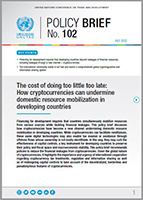
Financing for development requires that countries simultaneously mobilize resources from various sources while tackling financial leakages.
This policy brief discusses how cryptocurrencies have become a new channel undermining domestic resource mobilization in developing countries.
While cryptocurrencies can facilitate remittances, these same digital technologies may also enable tax evasion or avoidance through offshore flows whose ownership is not easily identifiable. In this way, they may curb the effectiveness of capital controls, a key instrument for developing countries to preserve their policy and fiscal space and macroeconomic stability.
This policy brief recommends policies to reduce the financial leakages from cryptocurrencies. Given the global nature of cryptocurrencies, it highlights the importance and urgency of international cooperation regarding cryptocurrency tax treatments, regulation and information sharing as well as of redesigning capital controls to take account of the decentralized, borderless and pseudonymous features of cryptocurrencies.
Key Points:
- Financing for development requires that developing countries staunch leakages of financial resources, including leakages through a new channel – cryptocurrencies.
- The international community needs to act fast and launch a comprehensive global crypto regulation and information-sharing system.
Recommended policies
While not exhaustive, the following policies provide the potential to halt the financial leakages via cryptocurrencies:
- To improve taxpayer compliance rates and combat tax evasion, tax authorities should clearly define the legal status of cryptocurrencies and require crypto exchanges, e-wallet providers and decentralized finance platforms to report gross inflows and outflows on all business and personal accounts.
- Given the fast-evolving nature of cryptocurrencies and their ecosystem, countries urgently need to agree and implement a global tax cryptocurrency regulation that considers the needs and challenges of developing countries and gives them adequate representation.
- Apart from global tax coordination, a comprehensive system of information sharing on cryptocurrency holding and trading is necessary, such as through a common reporting standard. Such measures would support countries to detect evasion of capital controls and enforce taxes.
These three recommended policies are also crucial to the effectiveness of two other initiatives:
- Although cryptocurrencies may facilitate remittances, given the negative socioeconomic impact these private digital currencies bring about, countries should consider imposing higher taxes on them in comparison to other financial assets to discourage holding and transacting cryptocurrencies.
- Countries should redesign their capital controls to include flows channelled through cryptocurrencies. Alternatives include imposing financial tax on cryptocurrency trading and limiting the amount of individual transactions on crypto exchanges. Moreover, central bank digital currencies could be designed to allow for the functioning of capital controls. Without adapting to new digital alternatives, the effectiveness of these controls may be undermined.





